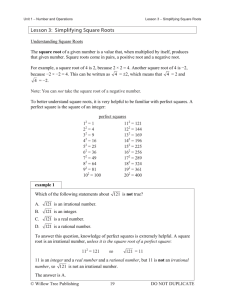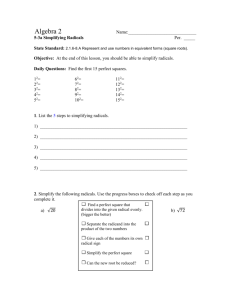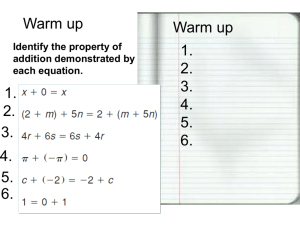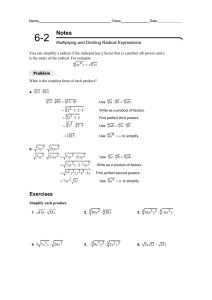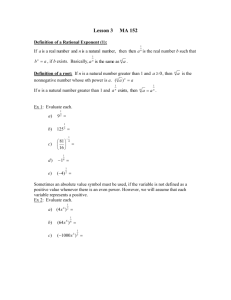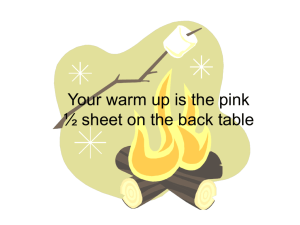Part 3: Solving Quadratic Equations by Taking Square Roots
advertisement
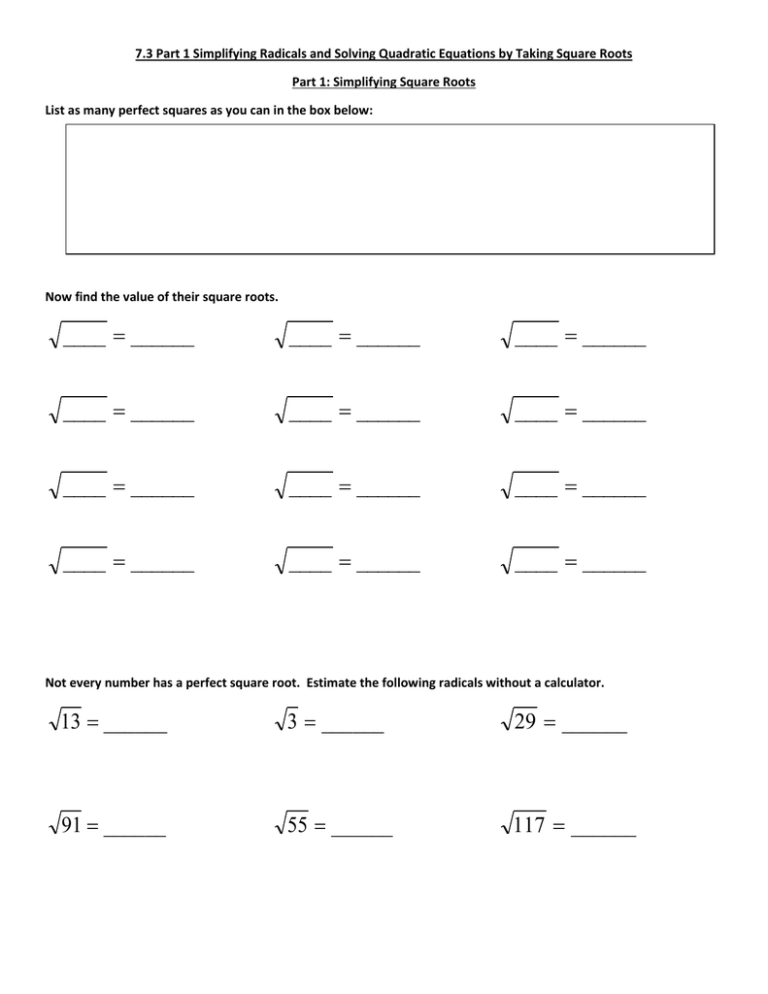
7.3 Part 1 Simplifying Radicals and Solving Quadratic Equations by Taking Square Roots Part 1: Simplifying Square Roots List as many perfect squares as you can in the box below: Now find the value of their square roots. ____ ______ ____ ______ ____ ______ ____ ______ ____ ______ ____ ______ ____ ______ ____ ______ ____ ______ ____ ______ ____ ______ ____ ______ Not every number has a perfect square root. Estimate the following radicals without a calculator. 13 ______ 3 ______ 29 ______ 91 ______ 55 ______ 117 ______ With fractions, we always write our answers in simplest form (reduce, no decimals!!!!!!!) 24 18 With radicals, we always write our answer in simplest form as well (reduce by perfect squares, no decimals) Method 1: Factor Tree Method 2: Perfect Squares Example: 12 12 Example: 27 27 Example: 3 40 3 40 Your Turn! Simplify each square root. 1. 18 2. 4. 8 84 5. 54 12 300 3. 60 6. 7 425 Part 2: Rationalizing the Denominator When simplifying radicals, we may never have any radicals in the denominator, so we perform a process called RATIONALIZING THE DENOMINATOR, meaning we want the bottom of the fraction to end up with just the number, no radical. Follow the steps to rationalize the denominator. Example1: 3 5 3 5 5 5 3 5 25 3 5 5 Example 2: 2 8 2 8 8 8 2 8 64 There is as radical in the denominator. Multiply the numerator and denominator by the radical that we want to get rid of. Simplify. Simplify. 5 does not go into 3, so the fraction cannot be reduced any further. There is a radical in the denominator. Multiply the numerator and denominator by the radical that we want to get rid of. Simplify. 2 8 22 2 4 2 2 8 8 8 2 Simplify. 3 2 5 7 Example 3: There is a radical in the denominator. 3 2 7 5 7 7 Multiply the numerator and denominator by the radical that we want to get rid of. 3 14 5 49 Simplify 3 14 3 14 57 35 Square root of 14 cannot be simplify and 35 and 3 cannot be simplified, so we’re done. Your Turn! Rationalize the denominator. Hint: Simplify radicals, divide radicals, and take perfect squares before rationalizing denominators to make your work easier. 1. 4. 12 10 1 √2 8) 2. 5. 2 5√7 13 32 2 √4 9. 3. 6) 3 7 √3 √5 9 20 12 48 7) 10. 5 12 2 √7 √4 Part 3: Solving Quadratic Equations by Taking Square Roots Solve x2 = 18 Solve (x + 4)2 – 3 = 17 Solve 6x2 – 240 = 0 Solve 3x2 + 21 = 5 Solve 3x2 – 7 = 4 Your Turn to Practice! Solve each equation. Leave your answer in simplest form and round your answer to the nearest hundredth. 1. (3x + 1)2 = 15 2. (x – 3)2 = 12 3. (2x – 5)2 = 24 4. (7x – 5)2 – 75 = 0 5. 3x2 – 27 = 0 6. (x – 2)2 – 25 = 0 7. (x + 1)2 - 9. 9 4 1 ( x 5) 2 7 3 =0 8. (x – 3)2 + 18 = 0 10. 5(2x + 1)2 – 6 = 6 Name: _________________________ Date: ________________________ Homework 7.3 part 1 – Square Roots and Equations Simplify each square root and rationalize the denominator. 1) 4√10 √2 2) 3 3) √5 2 4) √90 5) √50 6) √48 7) √3245 8) √18 9) 4√8 10) 3√16 17 √2∙√3 11) 5√125 Solve each equation for x. Leave your answer in simplest form AND round your answer to the nearest hundredth. 12) 2(3x – 8)2 – 8 = 0 13) 5x2 = 80 14) 5x2 – 49 = 0 15) 3x2 – 24 = 0 16) 2x2 - 64 = 0 17) 4x2 = 27 Name: ______________________________ Exit Ticket 7.3 part 1 1) Solve the equation by factoring 9x2 – 25 = 0 2) Solve the equation by square root 9x2 – 25 = 0 3) Which method do you prefer? 4) How do you know when to use either method? Name: ______________________________ Exit Ticket 7.3 part 1 1) Solve the equation by factoring 9x2 – 25 = 0 2) Solve the equation by square root 9x2 – 25 = 0 3) Which method do you prefer? 4) How do you know when to use either method?
